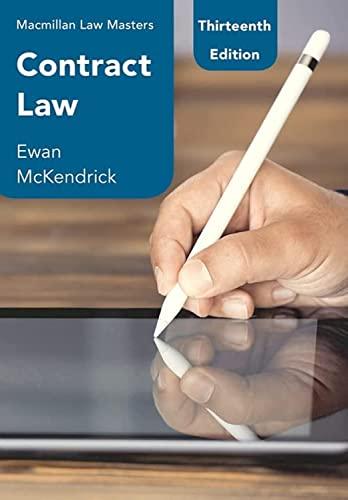Question
Please Read Question: Based on the advantages and disadvantages of each of the following forms of businesses, give an example of a business that would
Please Read Question:
Based on the advantages and disadvantages of each of the following forms of businesses, give an example of a business that would be best suited to that particular form. Be sure to explain why that is the best option for the particular business.
(1) Sole proprietorship
(2) Limited partnership
(3) Corporation
(4) Limited Liability Company
Please Read the Answer:
1) The advantages of a sole proprietorship can be seen with the initial cost needed to pay prior to startup. Since it isn't expensive to form and maintain, it is a very attractive way to start a business. However, the unfortunate aspects are the fact that there isn't personal liability protection, there is limited growth potential, and no tax benefits. Even with those disadvantages, this is the most popular structure businesses pick, especially small scale. There are several businesses best suited for this structure, but I'm going to pick retail. There isn't much risk for a retail store to go with this option since there isn't much monetary requirements.
2) Limited partnership is another business structure, this one having a lot of certain tax advantages. Also, there are good liability protections for limited partners, which is what a lot of people like. The fallbacks though, are there's a lot of documentation to be done, there isn't as much protection on excessive tacation, and most of all, partnership is terminated upon death of one of the partners. My recommended business for this would be a limited time project. Since it's only done for a limited time (for instance, constructing a building) then there are less likely to be drawbacks from the unfortunate side of having limited partnership.
3) A top advantage for a corporation is the limited liability aspect. In this instance, the shareholders can only be liable up to the amount of what they put into the company. This is good since corporations are typically large with many shareholders so none take the brunt of whatever poor decisions get made to cause them monetary losses. They also don't pay income taxes if the corporation is structured as an S corporation since the profits and losses are passed down through to the shareholders. Even though they don't pay income taxes, the unfortunate side is they pay double taxes, which kind of makes up for the no income taxes. Also there's a lot of taxes to be filed. Stocks are also really important with corporations, so my suggestion would be any large company with the intended use of many shareholders.
4) Limited liability companies are a fantastic way to start a new business since they're very versatile. (I actually have one!) They provide the same limited liability as a corporation, but also significantly cheaper. They're very simple to create and use, and super flexible. They are more costly to form than a sole proprietor, though. Also, if someone desires outside investors for their business, it isn't recommended to get an LLC. Since it's what I chose for my business, I'm going to say what I use it for. I have a home bakery, this structure is best for me since it ensures the liability aspect is taken care of, also it's great for tax purposes. Since I'm not branching out as a large entity, I don't need to worry about any issues with lack of potential shareholders.
Please answer the Question:
Based on the answer provide, are you agree or disagree, and why?
Step by Step Solution
There are 3 Steps involved in it
Step: 1

Get Instant Access to Expert-Tailored Solutions
See step-by-step solutions with expert insights and AI powered tools for academic success
Step: 2

Step: 3

Ace Your Homework with AI
Get the answers you need in no time with our AI-driven, step-by-step assistance
Get Started


